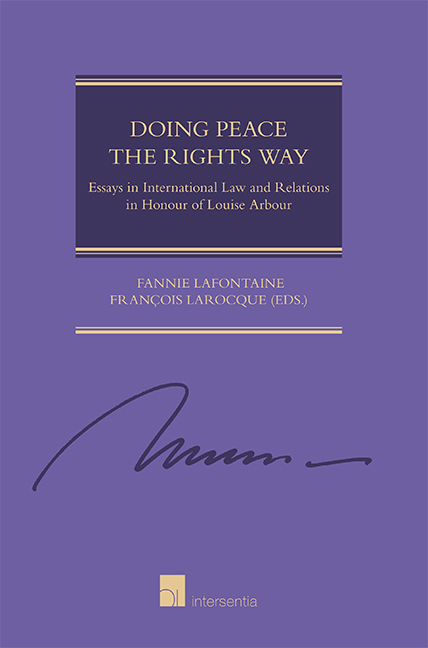Book contents
- Frontmatter
- Foreword
- Contents
- List of Contributors
- Introduction
- PART I OF FREEDOM AND EQUALITY
- PART II OF PEACE AND JUSTICE
- The Deterrence Rationale in a Criminal Justice Accountability Regime
- Peace and Justice: Human Rights Fact-Finding in Raging Conflicts
- “Exceptional Measures” in Times of Crisis: Terrorism, National Security and the Rule of Law
- When the End Lacks the Means: National Prosecutions of International Crimes and Canada's Paper Tiger Approach
- The Independence of International Prosecutors: Where Law Meets Realpolitik
- Torture, Jurisdiction and Immunity: Theories and Practices in Search of One Another
- Revisiting Challenges to International Humanitarian Law
- PART III OF WOMEN AND LEADERSHIP
- An Interview with the Honourable Madam Justice Louise Arbour
When the End Lacks the Means: National Prosecutions of International Crimes and Canada's Paper Tiger Approach
from PART II - OF PEACE AND JUSTICE
Published online by Cambridge University Press: 13 April 2019
- Frontmatter
- Foreword
- Contents
- List of Contributors
- Introduction
- PART I OF FREEDOM AND EQUALITY
- PART II OF PEACE AND JUSTICE
- The Deterrence Rationale in a Criminal Justice Accountability Regime
- Peace and Justice: Human Rights Fact-Finding in Raging Conflicts
- “Exceptional Measures” in Times of Crisis: Terrorism, National Security and the Rule of Law
- When the End Lacks the Means: National Prosecutions of International Crimes and Canada's Paper Tiger Approach
- The Independence of International Prosecutors: Where Law Meets Realpolitik
- Torture, Jurisdiction and Immunity: Theories and Practices in Search of One Another
- Revisiting Challenges to International Humanitarian Law
- PART III OF WOMEN AND LEADERSHIP
- An Interview with the Honourable Madam Justice Louise Arbour
Summary
INTRODUCTION
“ I postulate, essentially, that as we now stand, we should expect a continued growth in the reach of national courts for international crimes committed outside their territory, above and beyond any activities that the ICC may undertake in its own right in the foreseeable future.” Louise Arbour's 2003 prediction, or “speculation” as she put it, at the moment that the International Criminal Court (ICC) was just coming into existence, has proven to be quite accurate.
Numbers are difficult to ascertain, but scholars and organizations count that a few dozen countries have been involved in the prosecution of genocide, war crimes and crimes against humanity in the last decades, resulting in hundreds of convictions. Courts of states where crimes occurred are very busy: for instance, the ad hoc international tribunals – the International Criminal Tribunal for the former Yugoslavia (ICTY) and the International Criminal Tribunal for Rwanda (ICTR) – have transferred some accused persons to Serbia, Bosnia and Herzegovina and Rwanda, and national courts there have already tried thousands of perpetrators. Latin American countries have now prosecuted hundreds of suspects of international crimes associated with the brutal dictatorships of the 1970s. Numerous suspects have also been prosecuted on the basis of universal jurisdiction in a growing number of states and more than ever on different continents: Argentina, Austria, Belgium, Canada, Denmark, Finland, France, Germany, the Netherlands, Norway, Senegal, South Africa, Spain, Sweden, Switzerland, the United Kingdom and others.
Universal jurisdiction can be defined as: “The assertion by one state of its jurisdiction over crimes allegedly committed in the territory of another state by nationals of another state against nationals of another state where the crime alleged poses no direct threat to the vital interests of the state asserting jurisdiction.” The number of cases based on universal jurisdiction has increased steadily: close followers have documented that in 2017, specialized war crimes units within states have publicly investigated, prosecuted or brought to justice 126 suspects of international crimes, with 13 convictions. Hundreds of other cases are being investigated confidentially. niversal jurisdiction – despite innumerable writings that had announced its fall– also features quite highly on international and regional political and judicial agendas.
- Type
- Chapter
- Information
- Doing Peace the Rights WayEssays in International Law and Relations in Honour of Louise Arbour, pp. 221 - 252Publisher: IntersentiaPrint publication year: 2019



